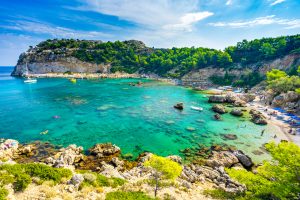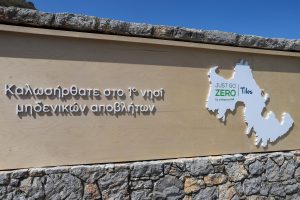The island of Rhodes was thrust into debates over the impact of climate change on tourism when forest fires compelled the evacuation of over 19,000 tourists last August. Fast-forward six months, the island has an updated strategy on how to transition to a “sustainable tourist destination” that factors in resilience to climate change. Still, work needs to be done on a national level to make sustainable tourism possible, and uncertainty remains as to how the changes will be perceived by visitors and who will bear the extra costs.
The Burden
Island and coastal tourist destinations are traditionally heavily populated and are characterized by intense use of the coastal environment through a wide range of activities. Highlighting this fact, the European Union notes that approximately 44% of its population lives within 50 miles of the coast and activities in the coastal zone comprise almost 40% of Europe’s GDP.

These activities support livelihoods and rely on healthy coastal ecosystems to drive economic growth for key sectors like fisheries and aquaculture, tourism, energy, shipping and port activities, as well as innovative areas such as renewable energy and marine biotechnology. Shipping and tourism alone accounts for 73% of the ocean economy’s total employment, according to US’s National Oceanic and Atmospheric Administration.
Coastal tourism supports local communities but also greatly burdens coastal environments over a relatively short period of time. For example, 15 coastal regions in Greece, Bulgaria, France, Croatia, Italy Romania and Sweden post 50% of their tourist occupancy and tourist activities in just two months each summer – July and August. Meanwhile, coastal zones are heavily impacted by climate change, whether directly or indirectly, via flooding, storms, coastal erosion, biodiversity loss, eutrophication, saltwater intrusion and more.
The Challenge for Rhodes, the South Aegean, and all Tourist Destinations
Understanding the complexity of the climate change- tourism nexus and commenting on the critical need to transition Rhodes to a more sustainable tourism model, the Governor of the South Aegean Region George Hatzimarkos said to ToVima, “Sustainability is a matter of survival for us and for our island… It’s not just a policy, it’s a journey on which we need industry, the travel community and society as a whole to join us.”
Greece and the South Aegean region have launched a number of sustainable projects until now, including the GR-eco Island Initiative that turns Greek islands into models of green energy, an e-mobility project on the island of Astypalea, and the Tilos—Just Go Zero project that saw Polygreen transition that island to zero waste. But none have aspired to transform the entire travel value chain of an island that derives almost 97% of its GDP from tourism and has a population of 125,000 persons that balloons to 550,000 in the summer.

Εγκαίνια του καινοτόμου προγράμματος “Just Go Zero Tilos”, που έχει ως στόχο να μετασχηματίσει την Τήλο στο πρώτο νησί μηδενικών αποβλήτων από τον υπουργό Ενέργειας Κώστα Σκρέκα και τον υπουργό Επικρατείας Άκη Σκέρτσο, Τρίτη 10 Μαΐου 2022. Το έργο χρηματοδοτείται και υποστηρίζεται εξ ολοκλήρου με τεχνολογία και τεχνογνωσία από την Polygreen και υλοποιείται σε συνεργασία με τον Δήμο Τήλου.
(ΑΡΓΥΡΩ ΑΝΑΣΤΑΣΙΟΥ/EUROKINISSI)
The goal is ambitious and complex, and includes large-scale public infrastructure works and initiatives to catalyze changes in the private sector. But when asked about the greatest challenges involved in effecting such a transition, the Governor focused on the human element: “Convincing all our co-citizens and professionals to come on board is actually the fundamental challenge we need to rise to.”
Moving away from the well-oiled Beach & Sun model won’t be easy though. In 2023, the region ranked first in Greece in terms of revenues, posting 4.9 billion euros and capturing 28% of Greece’s tourism receipts, according to recent data from the Bank of Greece (BoG), driven by holidaymakers that come in droves in July and August.
And despite the disruptions caused by the forest fires, holidaymakers want more of the same. An executive from one of the world’s top travel companies, TUI, was recently quoted in the Greek press saying that “Greece is heading for its best performance of all time in the 2024 tourist season… Crete, Rhodes, and Kos are our clients’ favorites, ranking third, fourth, and fifth in the preferences of German holidaymakers.”
So concerns expressed by some clusters in the travel value chain about how a more “sustainable”—and possibly more expensive—holiday experience will sit with tourists visiting Rhodes are justified.
Addressing such fears, a representative of the Restaurant Association of Rhodes said, “I am afraid that if we change, tourists won’t like what we have to offer. They come here for a holiday to escape the pressures of their own countries, not for us to tell them what to do.”

The truth is that every business will be impacted differently at first, whether it be from absorbing the impact of additional costs related to sustainability certifications and the use of certified sustainable product, or organizing upskilling programs, addressing supply challenges when sourcing locally, and convincing visitors to support the mandatory phase out of single-use plastics.
What Tourists Think about Sustainability
Fortunately, there are market insights that may help forge a pathway, such as the 2023 “Cost vs Conscience” report from the well-known Bookings.com website. According to the report, 74% of the 33,000 travelers interviewed across 35 countries believe it is imperative to “act now and make more sustainable choices to save the planet for future generations.”
Moreover, travelers are willing to take some of their sustainable habits from home with them when traveling, particularly in relation to turning off air conditioning units and reusing towels (over 60%), while 74% of travelers wanted travel companies to offer more sustainable travel options.
The dilemma comes when travelers have to reach deeper into their pockets for sustainability. “Nearly half (49%) of travelers believe more sustainable travel options are too expensive” and want discounts, points or other incentives to make the right choice. Yet “43% of today’s travelers say they would pay more for travel options with a sustainability certification.”
The abovementioned data, particularly in relation to tourists’ willingness to go “sustainable,” has been echoed by other reports. However, it also reveals some crucial barriers for Greece on its journey to “sustainable tourism.” First and foremost, Greece lacks a nationally recognized sustainable certification process for the hotel and accommodation sector.
Sustainability Certification in Greece and Greenwashing
While the Global Sustainable Tourism Council (GSTC) is globally recognized and an affiliate of the United Nations World Tourism Organization (UNWTO), it does not have an official presence in Greece. Instead, there is fragmented landscape of similar and related certifications like Green Key and Travel Life, along with a host of other ISO and specialized certifications. But these are not connected to an obligatory national program, such as the one launched recently by Greece’s neighbor and competitor for tourism shares – Turkey.
Fortunately, the Hellenic Chamber of Hotels is planning to launch a mandatory national sustainability certification program this spring which, according to reports, will take into consideration the fact that most Greek hotels are small to medium-sized family run businesses with fewer than 40 rooms. That said, it is not yet clear how many years the process will take to complete, nor what technical and economic barriers hotels will have to overcome to be certified.
Sustainability certification takes on renewed importance from a legal and marketing perspective as well, in the light of the European Union’s ban on “greenwashing.” Several large travel companies in Europe are already in court for selling “sustainable tourism” products that could not back their claims up with concrete data.
Creating a New Market through Education and Incentivization
Still, certification is just one part of the puzzle for Greece’s transition to “sustainable tourism.” Education is a key pillar of any transition, and tourist destinations will need to sensitize, educate, train, upskill and reskill their citizens to hit the mark. But tourists and visitors must also be empowered, informed and encouraged to do their part.
Tourist destinations should ask visitors to adopt sustainable practices during their stays and, in turn, destinations must encourage them to make the right choices through incentives, points, discounts and special benefits. Educating Europe’s travelers should be a priority for the EU as well, particularly in light of recent Eurostat figures that show the EU tourism sector has recovered to pre-pandemic levels with overnight stays surpassing 2.92 billion in 2023.
While some argue that tourism’s footprint is so large it can never be sustainable, Greece is so reliant on tourism and simultaneously susceptible to the impacts of climate change, that it is imperative for the country to facilitate the holistic transformation of the sector through all means possible.
This article is part of a special thematic series covering key issues related to the 9th Our Ocean Conference, which will be hosted by Greece this year and held in Athens from April 15–17 at the Stavros Niarchos Center.






